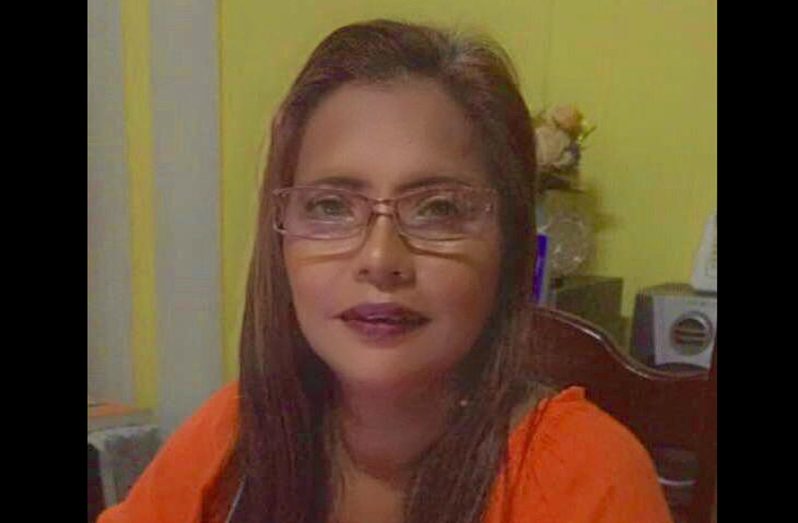-laments stigma, calls for community support
IT’s 02:00 hours. The average person might be asleep, sound asleep, actually. But Shanti (not real name) is crouched behind her wardrobe frantically sending a ‘Please call me’ toll-free text to a known women’s rights activist.
Since the pandemic has caused her abuser- her husband- to be at home more often, this is perhaps the only time she can reach out for help, without him knowing.
Bibi Ahamad, a psychologist and women’s rights activist, sees the message and returns the call instantly. As a survivor of domestic violence and Gender-Based Violence (GBV) herself, Ahamad knows all too well how vulnerable women like Shanti are.

“They (women in abusive relationships) do this because while the abuser is sleeping, that’s the only time they can communicate. Some of them would go in the washroom area or behind the wardrobe,” Ahamad told the Guyana Chronicle in a recent interview.
For more than 20 years, Ahamad has been an advocate for vulnerable groups, such as women and children. But, during that time, for 17 years, she was also abused physically, sexually, verbally and emotionally. No one knew about what she was enduring, save for her abuser and her now 15-year-old daughter.
“Being in an abusive situation, it tells on you psychologically more than you would realise at the time of the abuse,” Ahamad said, explaining that even though she was helping vulnerable women, she felt trapped in her situation at the time.
Ahamad attempted to rid herself of her abuser, when he almost killed her, and though she reported him to the police, the thought of the stigma her daughter would face if her father was imprisoned prevented her from completing the process. Though the physical abuse stopped after she gradually let him return to the household, the abuse did not stop. Subsequently, she spoke to her daughter about what actions she was going to take, and Ahamad removed the abuser from the home.
“The physical scars, they would heal but the emotional scars… they don’t go away that easily,” she said while almost unconsciously brushing her hand along the ‘black and blue’ marks.
After removing her abuser, the long but necessary healing process began for her and for her daughter. Counselling and having a solid support system were crucial along the road to recovery. At first, she blamed herself for “putting up” with the man for so long, and then for also letting him back into her home.
But now, she doesn’t. She understands that each situation vulnerable women are faced with has its own “complexities”.
COVID-19 Pandemic
The COVID-19 pandemic is one occurrence which complicates the circumstances vulnerable women are faced with. So far, for this year alone, a total of 17 women have been killed by their spouses, leaving 43 children motherless, Minister of Human Services and Social Security, Dr Vindhya Persaud, said recently.
Recently, women’s rights activist, Danuta Radzik explained that for this year, there were a number of challenges stemming from the COVID-19 which led to an increase in domestic violence cases. She stated that the stay-at-home guidelines constrict women and children to homes where their abusers are; here, there may be increased tension due to a loss or reduction of livelihoods, for example.
Also, social services offered by non-governmental organisations (NGOs), such as Help and Shelter, the Ministry of Human Services and other agencies may not be operating at full capacity. This reduced the amount of help that can be offered to vulnerable groups.
Ahamad is part of The Caribbean Voice (TCV), a NGO, which provides aid to vulnerable groups like women and children, and also mental health support services.
“Because of COVID-19, we had to switch from direct intervention measures to those by phone or by any online methods,” Ahamad related. Since organisations like the TCV and others are not necessarily able to meet with many abused women during this time, novel approaches to providing help, such as online or telephone counselling, have been utilised.
Moreover, Ahamad related that fewer women are able to leave the abusive household because there are fewer support systems for them at this time- whether financial or family and friends. Thus far, TCV has been able to provide supplies for 25 women in abusive situations, but Ahamad lamented that there are dozens of women still to receive any help.
What the pandemic has done is exacerbate violence that is rooted in gender inequality, gender discrimination and a social system of patriarchy. Radzik emphasised that domestic violence and gender-based violence are not just a man getting drunk and beating his wife, or him beating his wife because she is not a ‘good’ housewife. While these are issues which should be addressed with much alacrity, she clarified that those occurrences are symptoms of a system which oppresses women and women’s rights.
Ahamad, too, acknowledged that there are systemic issues. And much more community support is needed to help address domestic violence and gender-based violence.
“Just like many other social issues, gender-based violence and domestic violence are taboo issues. There is a stigma that goes with it because people are judgmental,” she lamented.
Instead, she encouraged persons to stop stigmatising women as she called on community organisations, such as faith-based organisations, to play a greater role in helping to root out the violence and abuse.
“Victims out there, know that you are not to blame. Reach out to me anytime, if you don’t have credit in your phone, send me a ‘call me’ and I’ll get back to you.” Her number is: +592 621 6111



.jpg)









